Human actions have radically changed the surface of our world, and I've talked about that a great deal here on Steemit. The surface isn't the only part that's been affected, though- the depths are being changed just as much. Over the course of this series, I'll explore some of the many ways in which we're harming our oceans. First up? Coral reefs.
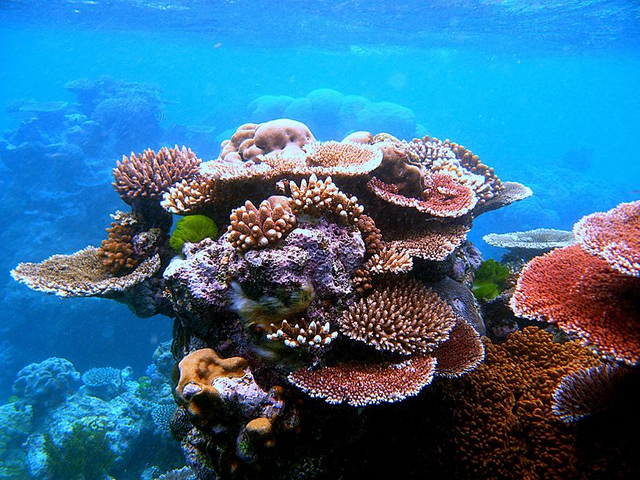
Part of Australia's Great Barrier Reef. [Image source]
Coral reefs are incredibly complex ecosystems. They take up less than a tenth of one percent of the geographical area of the ocean, and yet one fourth of all marine species are found there. Comparisons to the rainforest are particularly apt. They're the two richest types of ecosystem in biodiversity. They both thrive in surprisingly nutrient rich regions. Both have stunningly complex ecosystem webs that generate far more niches for organisms than are available in less dense ecosystems. Both function in three dimensions more than many other ecosystems. And both are under critical threat from humanity.
To understand the threats coral reefs today face, we should first talk about how coral reefs form. Corals are hard calcarous exoskeletons built by coral polyps. These polyps are Cnidarians- the same phylum that contains sea anemones and jellyfish. Coral polyps breed both sexually and asexually, an extremely effective combination of reproductive strategies. The coral structures themselves are built of calcium carbonate, the raw materials of which the polyps draw from the water around them. Coral polyps have a variety of feeding strategies. Many are filter feeders, using stinging tentacles to capture food. Most corals, however, depend on a symbiotic relationship with photosynthetic unicellular organisms known as zooxanthellae. The corals provide the zooxanthellae a safe place to live in the sun, the zooxanthellae provide the corals with food.
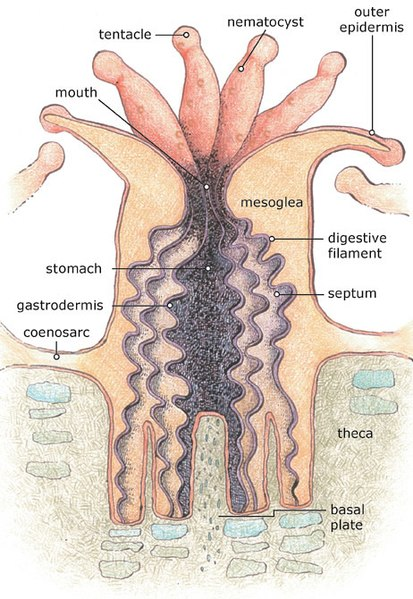
Anatomy of a coral polyp. [Image source]
Corals face a huge number of threats today. First, and most widely publicized, are their two major climate change related threats. The first of these is ocean temperature increases. When the water temperature gets high enough, the coral polyps eject the zooxanthellae living in their flesh. This helps the polyps survive in the short term, but since the zooxanthellae provide the overwhelming majority of their food, it can cause the polyps to starve quickly. As ocean temperatures increase, bleaching events become more and more common. The IPCC considers mass bleaching events to be the single biggest threat to the future of coral reefs. 2016 featured the longest and most severe bleaching episode known.
The second climate change related threat is ocean acidification. Ocean acidification is the sibling of climate change- both are caused by increased CO2 levels in the atmosphere. When it rains, the raindrops pick up CO2 from the atmosphere. They then react with the water to form carbonic acid. This is slowly making the oceans more acidic, when it should be slightly basic. Calcium carbonate, the material coral is made of, is easily soluble in acid. While the ocean has't gotten acidic enough to actively start dissolving coral, it has made it extremely difficult for coral polyps and other shell growing aquatic organisms (clams, for instance) to grow new armor. Ocean acidification also seems to make corals more vulnerable to mass bleaching events.
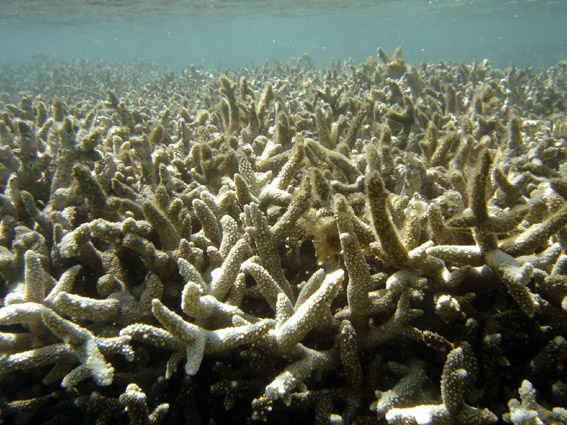
Coral after a mass bleaching event. [Image source]
Next up we have more direct human damage. Blast fishing is a highly destructive fishing method often used in third world countries. Drop explosives in the water, wait for them to detonate, collect the dead fish that float to the surface. The explosives also wreck the reef. The damage to the reef from a single blast can take 5-10 years to repair itself. Multiple blasts can destroy a section of the reef entirely.
Canal digging and dredging is also extremely harmful to reefs. Since reefs pose a major navigation hazard to ships, canals are often cut straight through the coral. Apart from actively destroying sections of the reef, it acts to divide up the sections of the ecosystem- and shrinking ecosystem size due to barriers (like coral free canals) is a surefire way to reduce its health. Regular dredging of said canals also releases large sediment plumes into the water, which can adversely affect coral reef health.
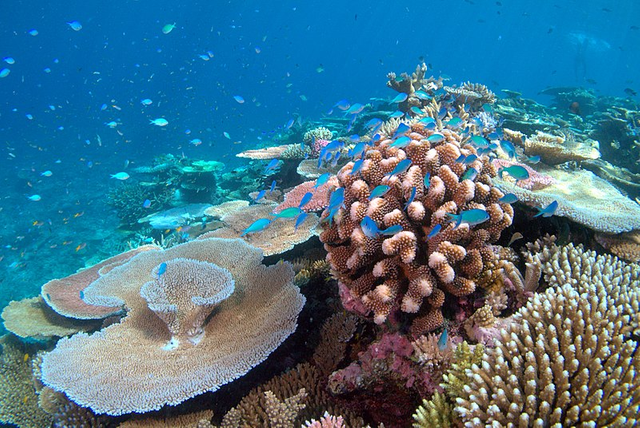
A healthy coral reef. [Image source]
Overfishing is also harmful to coral reefs. Deep sea trawling involves dragging huge nets across the sea floor. These nets can weigh up to 15 tons, and tend to utterly annihilate deep sea corals. These deep sea corals are primarily filter feeders and don't depend on sunlight to grow. As a consequence of this, they tend to be much slower growing as well, and take much longer to recover. The massive ecological damage of overfishing also harms reefs more indirectly- like any other ecosystem, they're an elaborate web, and damage to one part hurts the rest of it. I'll discuss overfishing more in a later post.
What we do on land is also a huge stressor to corals. Agricultural runoff is threatening coral reefs in a massive way. It causes algal blooms that suck the oxygen out of water as well as directly poisoning reefs. Likewise, heavy metal rich industrial runoff is causing severe damage. One of the most deadly threats from land based runoff is quite surprising: sunscreen. Many common sunscreen formulations are highly toxic to corals, promoting viral infections and contributing to bleaching events. If you're going to the beach, make sure to wear suncreens that contain titanium dioxide or zinc oxide- they're less harmful than many other sunscreens.
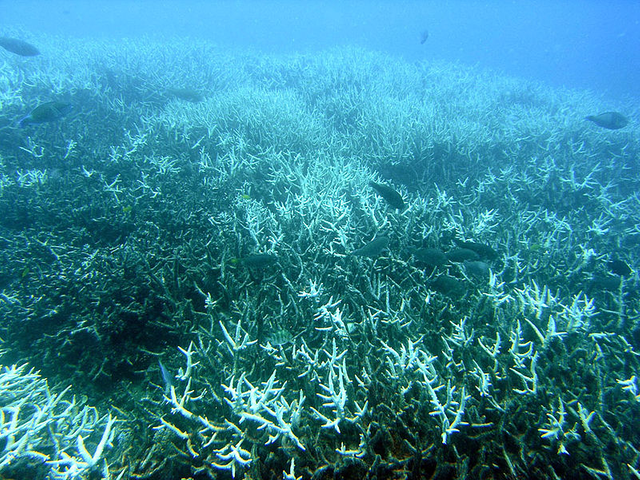
More bleached corals. [Image source]
The threats to coral reefs are extreme, but there are actions we can take to protect these delicate ecosystems. Establishing and growing new marine protective reserves and then enforcing and patrolling them is a key step. Being more cautious of our waste products being dumped into the ocean is another. The most important, however, is a course of action that provides direct advantages to in other ways as well: Regulating and limiting our greenhouse gas emissions.
Bibliography:
The Reef: A Passionate History, by Iain McCalman
The Sixth Extinction, by Elizabeth Kolbert
The Ocean of Life: The Fate of Man and the Sea, by Callum Roberts
https://en.wikipedia.org/wiki/Coral_reef
https://en.wikipedia.org/wiki/Coral
https://en.wikipedia.org/wiki/Zooxanthellae
https://en.wikipedia.org/wiki/Coral_bleaching
https://en.wikipedia.org/wiki/Blast_fishing
https://en.wikipedia.org/wiki/Overfishing

Thanks for this.
humans need to make up for all the loss big time.
Ive been wanting to join a coastal clean up if there are. But ive been so busy all I can do is make art that speaks.
:( I make wildlife art dedicated to hunted and abused animals and i should make underwater art too.
I upvoted and resteemed☝️
🌷🕊️ Thank you!!!!
Downvoting a post can decrease pending rewards and make it less visible. Common reasons:
Submit
You definitely should, I'd love to see it!
Downvoting a post can decrease pending rewards and make it less visible. Common reasons:
Submit
Yes thanks. Any suggestions?
I can draw some of your ideas :)
Then ill send u a scanned result of the art. :)
Downvoting a post can decrease pending rewards and make it less visible. Common reasons:
Submit
Interesting read. I never knew about all these problems and hope we can take action. We all need to work together!
Downvoting a post can decrease pending rewards and make it less visible. Common reasons:
Submit
We definitely do!
Downvoting a post can decrease pending rewards and make it less visible. Common reasons:
Submit
Great article! I read Elizabeth Kolbert's The Sixth Extinction last year and have been recommending it to all my friends and acquaintances since. I'm still amazed at how few even know these problems exist. I believe spreading awareness about these issues is a very important step towards preventing more damage. Thank you for sharing!
Downvoting a post can decrease pending rewards and make it less visible. Common reasons:
Submit
The Sixth Extinction is excellent!
Downvoting a post can decrease pending rewards and make it less visible. Common reasons:
Submit
I had heard about how the Coral Reefs are being bleached however I had no idea about how they are actually forms nor the what the insides looked like.
I only hope with sheer desperation that something is done to save all animal life on the planet however I fear a solution will not come fast enough.
Thank you for sharing this.
Downvoting a post can decrease pending rewards and make it less visible. Common reasons:
Submit
We're not out of time just yet! If we work hard, there's still a chance!
Downvoting a post can decrease pending rewards and make it less visible. Common reasons:
Submit
I hope so!!!
Downvoting a post can decrease pending rewards and make it less visible. Common reasons:
Submit
a healthy coral reef is a sign of a healthy ocean and these factors are connected all the way to the top. although the attitude of humans concerning waste management and disposal has changed with time, a lot of sensitization still need to be done to let people know about the life down there. i stand with the world of recyclers!
awesome post
Downvoting a post can decrease pending rewards and make it less visible. Common reasons:
Submit
We've made progress, but we have so much more progress to go!
Downvoting a post can decrease pending rewards and make it less visible. Common reasons:
Submit
yes! continues and deliberate effort would definitely yield good results
Downvoting a post can decrease pending rewards and make it less visible. Common reasons:
Submit
Thank you for spreading awareness. Everyone should know that our oceans play an important role for our existence!
Downvoting a post can decrease pending rewards and make it less visible. Common reasons:
Submit
Thanks for reading!
Downvoting a post can decrease pending rewards and make it less visible. Common reasons:
Submit
Our oceans ARE dying. Hopefully, it isn't too late. I really want to see a reef in person one day. Beautiful photos! Great article! Hope to see more from you!
Downvoting a post can decrease pending rewards and make it less visible. Common reasons:
Submit
You've got around 30 years before the reefs are all gone, so get a move on!
Downvoting a post can decrease pending rewards and make it less visible. Common reasons:
Submit
woww. First comment. It is no more than a coral jewelry jewel for our many. We could, however, know how important corals are for this world, and we gave them protection by not protecting them, but protecting them.
Downvoting a post can decrease pending rewards and make it less visible. Common reasons:
Submit
great article, I love the ocean and all his life forms.
Downvoting a post can decrease pending rewards and make it less visible. Common reasons:
Submit
Thanks!
Downvoting a post can decrease pending rewards and make it less visible. Common reasons:
Submit
Wow these are amazing photos! It is sad to know that we are destroying Earth's beauty with our actions. We must do better. :(
Downvoting a post can decrease pending rewards and make it less visible. Common reasons:
Submit
We can and should be doing better!
Downvoting a post can decrease pending rewards and make it less visible. Common reasons:
Submit
Congratulations! This post has been chosen as one of the daily Whistle Stops for The STEEM Engine!
You can see your post's place along the track here: The Daily Whistle Stops, Issue # 50 (2/19/18)
The STEEM Engine is an initiative dedicated to promoting meaningful engagement across Steemit. Find out more about us and join us today!
Downvoting a post can decrease pending rewards and make it less visible. Common reasons:
Submit
Being A SteemStem Member
Downvoting a post can decrease pending rewards and make it less visible. Common reasons:
Submit
Your Post Has Been Featured on @Resteemable!
Feature any Steemit post using resteemit.com!
How It Works:
1. Take Any Steemit URL
2. Erase
https://3. Type
reGet Featured Instantly � Featured Posts are voted every 2.4hrs
Join the Curation Team Here | Vote Resteemable for Witness
Downvoting a post can decrease pending rewards and make it less visible. Common reasons:
Submit